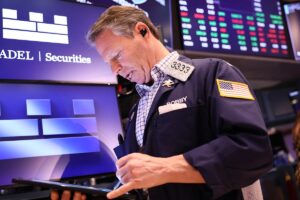The Future of Investing: Is the Stock Market Losing Its Appeal?
In a bold move that suggests a paradigm shift in the world of investing, Robinhood (HOOD) recently announced its venture into prediction markets. This innovative platform will let users trade on event outcomes, starting with notable occurrences such as the upcoming Federal Reserve meeting and the NCAA tournament. Just last month, Robinhood aimed to introduce betting on the Super Bowl but wisely withdrew that initiative, likely recognizing the need for a more regulatory-friendly and engaging approach.
A New Frontier for Investors
The prediction markets hub will be powered by KalshiEX LLC, a CFTC-regulated exchange, ensuring compliance with regulatory standards that are becoming increasingly critical in today’s financial landscape. Robinhood’s ongoing relationship with the CFTC underscores its commitment to innovation while navigating the regulatory framework—a crucial aspect in attracting both new users and retaining existing ones in a crowded marketplace.
Indeed, the reality of stock market investing may not be as appealing as it once was. As the lines between traditional investing and sports betting blur, we must ask ourselves: Is the future of investing really found outside the stock market?
Rethinking Traditional Investment Models
In a recent commentary by Bloomberg’s Matt Levine, he presented two prevailing mentalities about stock market investing: the belief that no one knows anything or that everyone knows everything. This duality leads many investors to adopt a straightforward strategy: to invest in low-cost index funds and focus their efforts elsewhere.
While this buy-and-hold strategy has gained popularity, it could alienate a growing segment of retail investors who crave engagement and excitement. As traditional investment firms become increasingly passive and dependent on the index fund model, they may unintentionally create a vacuum where innovation thrives—hence the rise of prediction markets.
The Appeal of Prediction Markets
Prediction markets offer an engaging alternative that allows participants to act on their insights, tapping into their understanding of information and risk assessment in real time. Unlike conventional investing, where portfolios often stagnate, prediction markets thrive on dynamic participation. They are fast-paced, discrete, and while they maintain an element of risk, they lack the complex derivatives that can create instability—a refreshing notion in an increasingly complex financial market.
Robinhood aptly notes that prediction markets can provide valuable economic tools through risk mitigation, information aggregation, and even educational opportunities. For many investors, these markets could offer a compelling alternative to the traditional approach, promoting continuous engagement within the financial ecosystem.
A Shift in Financial Landscape
However, with the introduction of new products like predicting market outcomes, does the average Robinhood user’s risk profile fundamentally change? The consensus is likely "no." For many retail investors, the risks tied to the stock market often mirror the risks reflected in their personal lives—whether it’s mortgages, retirement plans, or exposure to housing markets.
This signals a troubling trend: the stock market might diminish in relevance as these new forms of investment gain traction. Opportunities to "democratize" access to alternatives like private equity and venture capital are burgeoning, but they are not without their risks, as evidenced by the increasingly popular yes/no bets during the NCAA Tournament.
The Path Ahead
The conversation surrounding the stock market is evolving. With more investors seeking action over inaction, we may conclude that the traditional framework—buying and holding stocks—might not be as attractive in the long run. A testament to this evolution is the enduring appeal of sports: they’re dynamic, entertaining, and inherently unpredictable, factors that can often outweigh the complexities of stock market analysis.
As more participants enter the prediction market space, the traditional stock market’s role may continue to wane, pushing investors toward newer avenues of excitement and engagement. This shift not only alters how individuals invest but also how companies like Robinhood can generate user loyalty and engagement in a fast-changing financial landscape.
The bottom line? As the financial world continues to adapt, staying informed and engaged presents an exciting opportunity to explore unconventional avenues while navigating the unpredictability of investment options. At Extreme Investor Network, we’re here to guide you through these emerging trends along with unique insights to help you thrive in this new investing environment.

